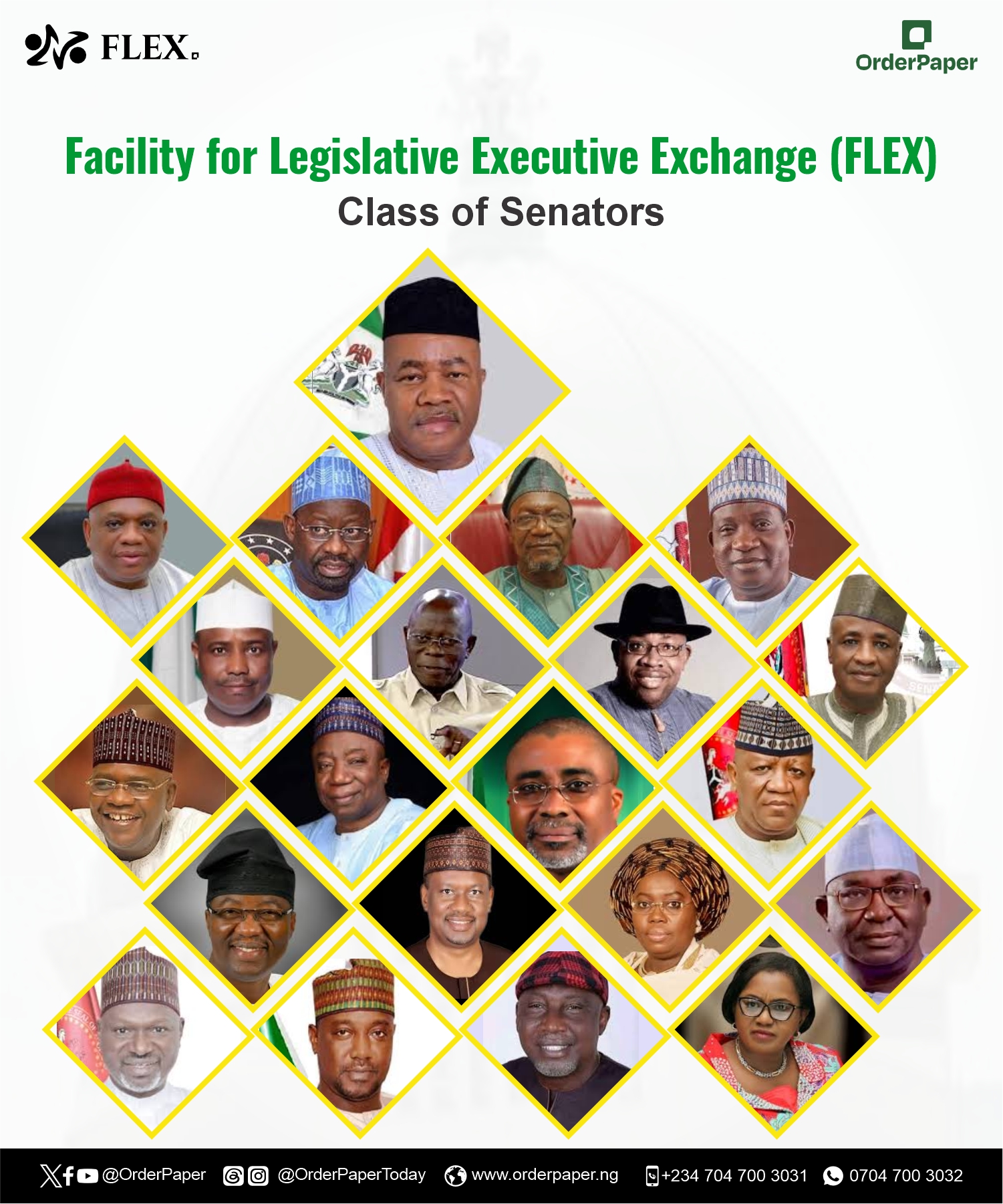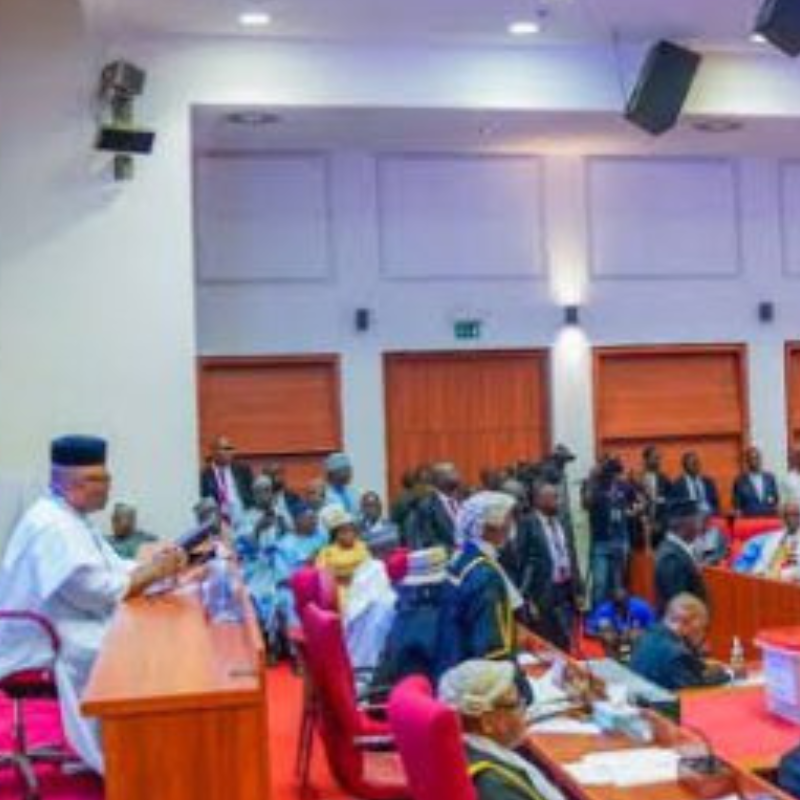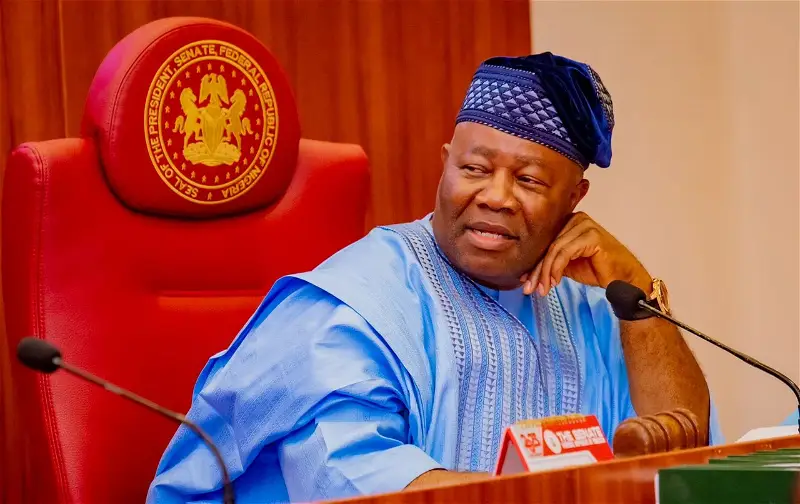These 21 senators have hitherto occupied roles in the executive branch of government, thereby making them ICONS candidates

In the 10th National Assembly, a significant number of former Nigerian governors have transitioned to legislative roles, particularly in the Senate.
While some observers suggest that this trend stems from a desire to maintain political influence after completing their constitutionally limited terms in the executive arm, OrderPaper, through its Facility for Legislative Executive Exchange (FLEX), notes a more nuanced, reciprocal pattern.
Political leaders increasingly move between the executive and legislative branches, bringing with them a wealth of institutional knowledge and insight into how laws are made and executed.
Over the 26-year span of Nigeria’s Fourth Republic, few public service narratives are as compelling as those of leaders who have seamlessly operated across both arms of government.
These individuals, recognized as FLEX ICONS by OrderPaper Nigeria, the nation’s premier parliamentary think tank, are not just seasoned politicians but transformational figures whose dual roles have helped define the architecture of modern governance in Nigeria.
Through the Initiative for Celebrating Outstanding National Statespersons (ICONS), OrderPaper spotlights these distinguished leaders via a commemorative Book of Records, digital repository, and an awards ceremony.
From ex-governors now in the senate to former lawmakers who later became ministers or deputy governors, these leaders demonstrate how legislative experience can shape better policy execution and vice versa.
This article profiles 21 senators and one House of Representatives’ member whose careers reflect the powerful convergence of executive insight and legislative acumen. Their unique vantage points have brought depth, continuity, and strategic direction to national policymaking.
Governors now senators
Senate President Godswill Akpabio
At the forefront of former executives now serving in the legislature is the President of the Senate, Godswill Akpabio.
Having previously served as Commissioner, Governor of Akwa Ibom State, and Minister of Niger Delta Affairs, Akpabio transitioned to the National Assembly where he held the position of Senate Minority Leader during his first term and now presides as Senate President.
During his tenure as governor, Akpabio championed landmark projects such as the Victor Attah International Airport, the Godswill Akpabio International Stadium, and the Ibom Specialist Hospital—positioning the state as a leader in aviation, sports, and healthcare. He also implemented free and compulsory education for all school-age children and ensured access to free healthcare for pregnant women, children, and the elderly.
ALSO READ: ICONS: 11 incumbent governors groomed in the legislature
Akpabio’s extensive experience across executive roles has significantly influenced his leadership approach in the senate, characterized by a commitment to national development, albeit without controversies.
Sen. Orji Uzor Kalu
Senator Orji Uzor Kalu epitomises the FLEX model, with a public service career that began in the aborted third republic but stood out in 1999. As Governor of Abia State (1999–2007), he reportedly prioritised infrastructure, education, and healthcare.
After a failed presidential bid in 2007, Kalu was elected senator for Abia north in 2019. Currently, he chairs the Senate Committee on the South East Development Commission (SEDC), after previously leading the Committees on Privatisation and Regional Development Commission Screening. Kalu’s steady transition from state leadership to impactful lawmaking embodies the essence of cross-branch governance celebrated under the ICONS initiative.
Sen. Mohammed Danjuma Goje
Sen. Goje also exemplifies the unique synergy between executive experience and legislative leadership. A seasoned public servant, Goje’s career spans decades of impactful service at both state and national levels, with each phase reinforcing his deep understanding of governance, policy formulation, and institutional development.
Goje served as a member of the Bauchi State House of Assembly (1979–1983) and as minister of state for power and steel from 1999 to 2001, where he contributed to foundational reforms in Nigeria’s energy sector. He later became the Governor of Gombe State (2003–2011), where his two-term administration was marked by notable development initiatives. As governor, Goje established Gombe State University, expanded road infrastructure, enhanced healthcare delivery, and prioritized education and social welfare, leaving an enduring legacy of inclusive development.
Since 2011, he has represented Gombe central in the senate, currently serving his fourth term. As Chairman of the Senate Committee on Inter-Parliamentary Affairs, Goje has consistently drawn from his vast executive background to influence legislative work, particularly in policy oversight, budgeting, and intergovernmental relations.
Sen. Aminu Tambuwal
Tambuwal exemplifies a rare blend of legislative and executive experience, having transitioned seamlessly between both arms of government. He served in the House of Representatives from 2003 to 2015, rising through the ranks to become speaker. During his tenure, he played a pivotal role in enacting key legislation such as the Terrorism (Prevention) Act 2011 and led Nigeria’s first constituency-based constitutional review sessions. He was also an active member of several strategic committees.
In 2015, Tambuwal moved to the executive arm as Governor of Sokoto State, where he served two terms until 2023. His administration prioritized education reform, transparency, and institutional strengthening, notably passing the Right to Education Bill to make basic education compulsory. Now back in the National Assembly as Senator for Sokoto South, Tambuwal chairs the Senate Committee on Housing & Urban Development and continues to champion issues such as agricultural investment and rural development.
Sen. Ibrahim Dankwambo
Sen. Dankwambo is a distinguished figure whose career reflects the transition from the executive to the legislative arm of government. After serving two terms as Governor of Gombe State (2011–2019), he was elected in 2023 as Senator representing Gombe north, where he currently chairs the Senate Committee on Drugs and Narcotics. Dankwambo draws on his vast experience as governor to influence legislation, champion constituency development, and contribute meaningfully to national discourse.
Before his governorship, Dankwambo served as the Accountant-General of the Federation (2005–2011), where he pioneered critical financial reforms such as the Treasury Single Account (TSA), Integrated Payroll and Personnel Information System (IPPIS), and GIFMIS—all aimed at enhancing transparency and efficiency in public finance. As governor, he implemented major infrastructure projects, modernized Gombe’s legal framework by reviewing 162 state laws, and introduced digital systems for staff management and educational development. His career is marked by innovation, impactful governance, and a legacy of reforms that align with the ideals of the ICONS of the Fourth Republic.
Sen. Yahaya Abdullahi
With a career spanning key roles in the executive arm including Director at the National Agricultural Land Development Authority and Permanent Secretary at the Federal Ministry of Niger Delta Affairs, Senator Yahaya Abdullahi brings decades of public service experience to his legislative duties. Since 2015, he has represented Kebbi north in the Senate and currently chairs the Senate Committee on National Planning and Economic Affairs.
Abdullahi’s executive background strongly informs his legislative priorities, particularly in agriculture and education. .
Sen. Aliyu Wamakko
Sen. Wamakko of Sokoto north has held several key positions, including local government chairman, deputy governor, governor, and now senator. His enduring contributions to grassroots engagement, education, and youth empowerment have significantly benefited Sokoto State.
During his tenure as governor, he prioritized educational progress and economic empowerment. In 2009, he founded Sokoto State University to broaden access to higher education and foster academic excellence in the region. His administration also established the State Poverty Reduction Agency (SPORA), which implemented targeted youth skills acquisition programs aimed at reducing poverty and unemployment.
Drawing from these executive experiences, Wamakko continues to influence national development and security through his active role in sponsoring and supporting bills and motions in the Senate.
Sen. Adams Oshiomhole
From labour leader to governor, party chairman, and now senator, Sen. Oshiomhole has shaped policy on labour rights by negotiating a 25 percent public-sector wage increase and organizing mass mobilizations against unjust fuel price hikes. As governor he established the Edo Contributory Health Scheme and thus expanded access to healthcare for citizens. His unique blend of labour activism and executive governance experience enables him to approach lawmaking with practical insight and a strong sense of accountability.
Sen. Simon Lalong
Former State House of Assembly Speaker, governor, minister, and now senator representing Plateau south, Sen. Simon Lalong brings a rich blend of State legislative and executive experience to the National Assembly. During his tenure as Speaker of the Plateau State House of Assembly, he was twice elected Chairman of the Conference of Speakers of the 36 States (2001–2002), a testament to the respect and confidence of his peers in legislative leadership.
As Governor, Lalong made a significant mark by establishing the Plateau Peace-building Agency which focused on fostering dialogue, reconciliation, and lasting peace among diverse communities. Now in the Senate, he is leveraging both his legislative and executive experience to influence national policy and governance. As Chairman of the Senate Committee on INEC and Electoral Matters, he plays a key role in shaping Nigeria’s electoral framework and promoting democratic consolidation.
Sen. Seriake Dickson
From serving in the House of Representatives to governing Bayelsa State for two terms and now as senator, Seriake Dickson has garnered a rich background in governance. His input as governor in institutionalising transparency laws and led reforms in education, health, and state finance now guides his role as chairman, Senate Committee on Ecology and Climate Change.
Sen. Otunba Gbenga Daniel
As former Governor of Ogun State (2003–2011), Otunba Gbenga Daniel championed economic revitalization, education reform, and healthcare upgrades through initiatives like Gateway Holdings and the establishment of Abraham Adesanya Polytechnic. Now serving as Senator for Ogun East and Vice Chairman of the Senate Committee on Navy, he leverages his executive experience to advocate for infrastructure development, youth empowerment, SME support, and improved federal-state investment synergies.
Sen. Muhammad Adamu Aliero
Having served as Governor of Kebbi State, Minister of the FCT, and now Senator for Kebbi Central, Sen. Aliero draws from his vast executive background, especially in his work on Abuja’s urban renewal to shape policy debates and infrastructure-focused legislation. As Chairman of the Senate Committee on Land Transport, he promotes national development through improved transport systems, planning discipline, and fiscal oversight.
Sen. Enyinnaya Harcourt Abaribe
With experience as Deputy Governor of Abia State and long-serving Senator, Sen. Abaribe applies his executive insight to national legislation. As Chairman of the Senate Committee on Power, he plays a key role in post-privatization reforms, while continuing to advocate for workers’ rights, electoral transparency, and democratic freedoms through his legislative leadership and civic engagement.
Sen. Abdulaziz Yari
Former Governor of Zamfara State (2011–2019), Sen. Yari brings a legacy of governance, peacebuilding, and infrastructure development into his role as Senator representing Zamfara West. As Chairman of the Senate Committee on Water Resources, he channels his executive experience into policies aimed at improving water infrastructure and rural development.
Sen. Haruna Manu
Transitioning from Deputy Governor of Taraba State (2015–2023) to Senator for Taraba Central, Sen. Manu uses his grassroots and executive experience to inform his legislative work. As Vice Chairman of the Senate Committee on Local and Foreign Debt, he advocates for sustainable development financing and rural empowerment initiatives.
Sen. Idiat Oluranti Adebule
Former Deputy Governor of Lagos State and education commissioner, Sen. Adebule brings her extensive policy and administrative background to the Senate. Representing Lagos West, she focuses on education reform, youth empowerment, and gender inclusion, drawing on her achievements such as the CodeLagos initiative and inclusive education programs.
Sen. Ikra Aliyu Bilbis
As former Minister of State for Information and Communication, Sen. Bilbis laid some foundations for Nigeria’s public communication systems. Now Senator for Zamfara Central and Chairman of the Senate Committee on Communication, he applies this experience to promote transparency, access to information, and constituent engagement through policy advocacy.
Sen. Abdulhamid Mallam Madori
From serving as Minister of State for Power and Steel to Nigeria’s Ambassador to Turkey, Sen. Madori blends diplomatic and executive experience in his current role as Senator for Jigawa North-East. As Chairman of the Senate Committee on Police Affairs, he champions institutional reforms, improved police training, and national security oversight.
Sen. Abubakar Sani Bello
As former Governor of Niger State, where he implemented major education, healthcare, and fiscal reforms, Sen. Bello now applies that legacy to his role as Senator for Niger North. As Chairman of the Senate Committee on Foreign Affairs, he brings governance and diplomacy experience to legislative oversight on international relations.
Sen. Abba Patrick Moro
Having served as Minister of Interior and ALGON Chairman, Sen. Moro brings executive insight into his role as Senate Minority Leader. Representing Benue South, he sponsors legislation on local government autonomy, veterans’ welfare, and electoral reform, underscoring his commitment to inclusive governance and national development.
Sen. Ipalibo Harry Banigo
From Deputy Governor and Head of Service in Rivers State to her current role as Senator for Rivers West, Sen. Banigo applies decades of health sector leadership and administrative expertise. As Chair of the Senate Committee on Health, she advocates for policy innovation, inclusive care, and modern healthcare systems, while also empowering women and youth through community-based initiatives.
A lone Rep: Julius Ihonvbere
Also featured is Rep. Julius Ihonvbere, the current House Leader, whose trajectory from academia to policy advisor and now top-ranking legislator reflects the intellectual depth within the 10th National Assembly.
Served as special Adviser to President Olusegun Obasanjo on Programme and Policy Monitoring (2003–2007), Rep. Ihonvbere played a pivotal role in harmonizing policy across ministries and the presidency.
He has continued to wield his influence and commitment in the House of Representatives having served as Chairman of the House Committee on Basic Education and Services in the 8th and 9th Assemblies, where he championed improved funding for UBEC and interventions to reduce Nigeria’s out-of-school children population. In the 10th Assembly, he is serving as the Majority Leader of the House, championing key national issues, including electoral reform, local government autonomy, and fiscal federalism.
These ICONS are more than political figures; they are institutional bridges between policy formulation and implementation. Their careers offer valuable lessons in public service continuity, and their dual roles enhance legislative productivity and governance synergy.
Through the FLEX platform, commemorative Book of Records, and digital archives, OrderPaper Nigeria is ensuring that their legacies are not only remembered but studied and celebrated cementing their place in Nigeria’s evolving democratic journey.




